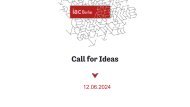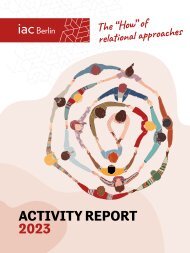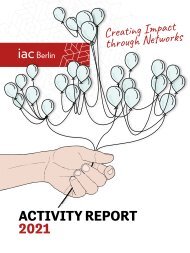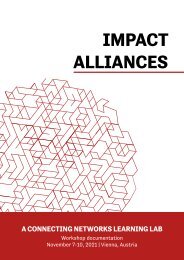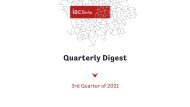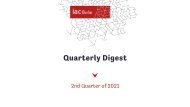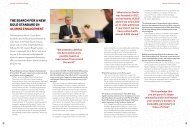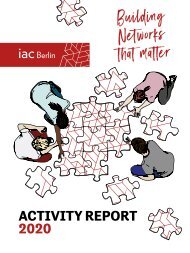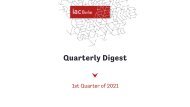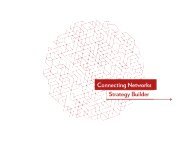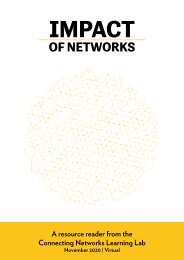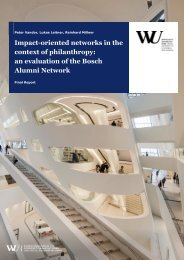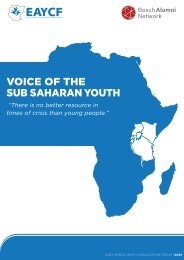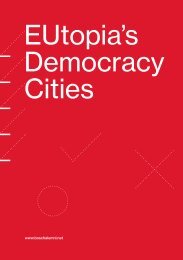iac Berlin - Activity Report 2022
As early as 1966, the philosopher Karl Popper addressed this issue and the limits of reductionism in his essay “Of Clouds and Clocks”. Only now we are starting to develop a language, models, and strategies on how to approach the “cloud-like” complex problems of our time. All articles in this Activity Report represent different approaches to learning and adjusting our network strategies accordingly. They span from the Bosch Alumni Network to the Global Diplomacy Lab, ANSTOSS DEMOKRATIE, the SDG Places, and the Wasan Community.
As early as 1966, the philosopher Karl Popper addressed this issue and the limits of reductionism in his essay “Of Clouds and Clocks”. Only now we are starting to develop a language, models, and strategies on how to approach the “cloud-like” complex problems of our time. All articles in this Activity Report represent different approaches to learning and adjusting our network strategies accordingly. They span from the Bosch Alumni Network to the Global Diplomacy Lab, ANSTOSS DEMOKRATIE, the SDG Places, and the Wasan Community.
You also want an ePaper? Increase the reach of your titles
YUMPU automatically turns print PDFs into web optimized ePapers that Google loves.
ACTIVITY REPORT<br />
<strong>2022</strong><br />
Strategic Network<br />
Development
Editorial<br />
CONTENT<br />
DEAR COLLEAGUES AND FRIENDS,<br />
03<br />
04<br />
08<br />
10<br />
12<br />
14<br />
16<br />
18<br />
20<br />
21<br />
22<br />
23<br />
Editorial<br />
Robert Bosch Stiftung: Long-term impact through networks<br />
Bosch Alumni Network: The benefits of a diverse network<br />
Bosch Alumni Network: Developing a decentralized network<br />
Global Diplomacy Lab: Asking for help<br />
ANSTOSS DEMOKRATIE: A new understanding of collaboration and funding<br />
SDG Places: The art of convening<br />
Wasan Network: Relational and collaborative approaches for social change<br />
Finance & Accounting<br />
General Information<br />
What we do and why we do it<br />
Impressum<br />
Our ways of understanding the world and approaching the challenges of our time are undergoing a radical<br />
transition. We are sensing that it is not enough to fix broken systems anymore—it’s time to change the game<br />
altogether. The challenges humanity faces are becoming increasingly interconnected and cannot be solved<br />
merely with linear “cause and effect” logic.<br />
As early as 1966, the philosopher Karl Popper addressed this issue and the limits of reductionism in his essay<br />
“Of Clouds and Clocks”. Only now we are starting to develop a language, models, and strategies on how to<br />
approach the “cloud-like” complex problems of our time.<br />
But have you ever tried to think in a non-linear way? I, for one, am not clever enough to do this alone.<br />
I believe, the only way to approach complex problems is together. The question we face now is: How?<br />
How do we intentionally apply relational and collaborative approaches? This question guided the work of the<br />
<strong>iac</strong> <strong>Berlin</strong> throughout <strong>2022</strong>. All articles in this <strong>Activity</strong> <strong>Report</strong> represent different approaches to learning<br />
and adjusting our network strategies accordingly.<br />
Still, even the meaning of the word “strategy” has changed in this current time of radical transition. From<br />
an orientation on a pre-given path towards a predictable and desirable future, it has now developed into<br />
an understanding of “strategizing on the way”—an adaptive approach that allows us to integrate harvested<br />
insights and patterns into our decision making.<br />
In the opening piece, Robert Bosch Stiftung´s CEO Bernhard Straub addresses the topic of ‘long-term<br />
impact through networks’. One of his central theses is that, once a network of partners and alumni has the<br />
freedom to learn and experiment, it becomes a strategic instrument for sensing the future for the foundation.<br />
From the Bosch Alumni Network, we compiled a report on the strategic benefits of a diverse network.<br />
This is exemplified by the Governance Academy, a dedicated format for supporting members to become<br />
agents of change. Additionally, five Cluster Moderators explain their core interventions in developing their<br />
communities and thereby contributing to the ongoing transition from centrally organized networks to<br />
decentralized structures.<br />
After the end of COVID-19-related travel and meeting restrictions, the Global Diplomacy Lab organized a<br />
total of 13 thematic labs in <strong>2022</strong>. Here, they report on the powerful and transformative role of asking for help<br />
during collaborative approaches.<br />
We also met with seasoned network developer and co-founder of ANSTOSS DEMOKRATIE Winfried<br />
Kneip for an interview on how close strategic network development is related to changing our understanding<br />
of funding and achieving collective impact.<br />
By integrating art into event design to help enable inner transformation and break down mental barriers, the SDG<br />
Places Initiative aimed to radically redefine gatherings. Their story is one of near-failure and eventual success.<br />
All these reports, findings and learnings are concluded by a substantive update on the Wasan Community.<br />
Founded in 2017, this global community of practitioners is working on finding ways to prepare for “cloudlike”<br />
problems and exploring how we can successfully apply relational and collaborative approaches towards<br />
systemic and lasting transformation.<br />
Our work is made possible thanks to the support of and collaboration with our colleagues and partners.<br />
It is a privilege to be connected to all of you through our shared ambitions and initiatives.<br />
Now, and without any further ado, I wish you all an inspiring and enjoyable time perusing our<br />
<strong>Activity</strong> <strong>Report</strong> <strong>2022</strong>.<br />
With warmest regards,<br />
Darius Polok, on behalf of the entire <strong>iac</strong> <strong>Berlin</strong> team<br />
02<br />
03
Robert Bosch Stiftung<br />
LONG-TERM IMPACT THROUGH NETWORKS:<br />
BOSCH ALUMNI NETWORK<br />
Bernhard Straub, CEO Robert Bosch Stiftung<br />
People react very differently to disasters and<br />
crises in their immediate vicinity. Some are<br />
overwhelmed, others just want to get away<br />
from it. Probably, very few people make plans<br />
for life after the catastrophe at this moment—<br />
unlike Alexander Shevchenko. He is an urban<br />
planner from Ukraine and a member of the<br />
Bosch Alumni Network (BAN).<br />
The alumni network plays an important role—<br />
particularly in times of crises<br />
This demonstrates the immense value of an alumni network for<br />
both parties: former grantees and foundations. In the spring of<br />
<strong>2022</strong>, Robert Bosch Stiftung was thinking about how to help<br />
the people in Ukraine. It quickly became clear that our alumni<br />
network with its many multipliers would play a central role.<br />
Through the Bosch Alumni Network, we are connected with<br />
more than 8,000 of our formerly funded partners from around<br />
140 countries—in some cases many years after the grant period.<br />
Shevchenko started thinking about urban reconstruction<br />
just weeks after the Russian attack began. He launched the<br />
ReStart Ukraine initiative in Chernihiv, which lies near Belarus<br />
and Russia. He and his team wanted to develop a model for<br />
how cities throughout the country could be rebuilt after the<br />
war. For ReStart Ukraine, the sustainability of reconstruction,<br />
such as climate protection in urban planning, was front and<br />
center. Simultaneously, Shevchenko’s team wanted to broadly<br />
involve the city’s residents so that they not only support<br />
the redevelopment and the changes in the city but actively<br />
participate in shaping them.<br />
To help with the NGO’s initial development and dissemination<br />
of its concept, Alexander Shevchenko was looking for sponsors.<br />
And he found them—through the Bosch Alumni Network. Still,<br />
ReStart Ukraine is not only receiving financial support via the<br />
network but contacts to further supporters as well.<br />
Shevchenko is one of several former Robert Bosch Stiftung<br />
grantees in Ukraine who have turned to the network for<br />
support in the context of the war. These people are not seeking<br />
personal aid in a moment of existential thread but support for<br />
projects and ideas that benefit their communities and society in<br />
the crisis.<br />
As a result of these activities, which often span decades, we<br />
have many direct contacts across the world. These contacts<br />
are people who not only have a better understanding of<br />
the situation in their country and society but can also make<br />
recommendations on where our help is needed most and will<br />
have maximum impact. Precisely this in-depth knowledge and<br />
the relationships we have built up over many years with former<br />
grantees in Ukraine proved highly valuable when we launched a<br />
special fund to support Ukrainians last year.<br />
reStart Ukraine - land use prop<br />
The Bosch Alumni Network is a learning and<br />
experimentation space<br />
Numerous organizations, foremost universities, but also<br />
companies from around the world have long relied on nurturing<br />
relationships with their alumni. With the creation of the Bosch<br />
Alumni Network, Robert Bosch Stiftung has taken a significant<br />
step beyond simply cultivating a network. It has given relationships<br />
with its former grantees a more modern framework<br />
through the special design of the network. BAN is a learning<br />
and experimentation space which looks toward the future. One<br />
of its key offerings is “engineered serendipity.” This refers to a<br />
controlled, and therefore not entirely random, serendipitous<br />
coming together of like-minded people who develop social<br />
projects and innovations of all kinds together with others. The<br />
network therefore deliberately offers its members plenty of space<br />
for exchange and encourages them to take the initiative<br />
—a feature that many active members praise in their feedback.<br />
The Bosch Alumni Network now connects people from more<br />
than 120 current and former programs. Since its inception, a<br />
guiding principle has been and remains the idea that “alumni<br />
become partners”. This illustrates the conviction that, ideally,<br />
alumni continue to be active in their communities even after<br />
their initial support and become involved in solving social<br />
challenges through the network. In this way, they continue the<br />
foundation’s work and have a positive impact on society.<br />
The success of BAN’s unique concept is reflected, among<br />
other things, in the high level of engagement in the network.<br />
Every fourth member participated in a (digital) Bosch Alumni<br />
Network event last year. There are regional and topic-based<br />
communities, overarching and mostly free offers by members<br />
for fellow members, or calls for joint projects. Former grantees<br />
exchange perspectives and opinions, share knowledge, and<br />
develop new ideas together. The BAN coordination team,<br />
located at the International Alumni Center in <strong>Berlin</strong> (<strong>iac</strong><br />
<strong>Berlin</strong>), a Do and Think tank for impact networks, supports<br />
the self-organization within the network. It provides resources,<br />
strengthens networking, makes available potentials as well as<br />
best practices visible, and supports members with their work .<br />
04<br />
05
Robert Bosch Stiftung<br />
FEEDBACK FROM THE NETWORK<br />
I want to say thank you again for the<br />
network. I am currently applying for my<br />
dream job, which I found through the<br />
Bosch Alumni Network!<br />
The alumni network provides the foundation<br />
with new impulses<br />
But membership in the network often means even more. A<br />
2020 evaluation by the Vienna University of Economics and<br />
Business found that one in three members concurred that the<br />
Bosch Alumni Network had helped them to continue their work<br />
despite a difficult economic, social, or political environment.<br />
Just like the case of Alexander Shevchenko’s urban reconstruction<br />
plan. It makes us proud to offer civil society organizations<br />
a safe space for their work and simultaneously to see what innovations<br />
emerge when former grantees find each other in the<br />
network and develop new projects together. The foundation<br />
also benefits from this in its work, as we draw new inspiration<br />
from alumni and consult them as “critical friends.”<br />
In the future, Robert Bosch Stiftung, together with the Bosch<br />
Alumni Network and <strong>iac</strong> <strong>Berlin</strong>, wants to bring this experience<br />
even more strongly into the field of philanthropy. We aim<br />
to address topics such as how foundations can use contacts<br />
to their former grantees for the future—as well as how this<br />
can flow back into a foundation’s work. Just like Alexander<br />
Shevchenko’s request for support for ReStart Ukraine has led to<br />
a lasting relationship with the Robert Bosch Stiftung.<br />
Surely both sides will benefit from this.<br />
At times the conversation would go<br />
till midnight by the fire side. This<br />
experience has been rich. Can’t wait to<br />
see what comes out of this.<br />
It was my first time at a Bosch Alumni<br />
Network event. Therefore, I was even<br />
more excited about the projects and<br />
people. It was really fun!<br />
It was a pleasure to cooperate with you. I can’t tell<br />
you how much this style of trust-based, hands—<br />
off approach with a lot of understanding for the<br />
changeable nature of reality means to us. It allows<br />
us to bring out our creativity and focus on the<br />
content instead of paperwork.<br />
I reached out through the network for<br />
Romanian organizations (… and) am in fact<br />
in the room with them facilitating a coalition<br />
building workshop in Timisoara right now!<br />
So, I just wanted to let you know the value<br />
the network is creating.<br />
I just realized that I never told to the Bosch Foundation<br />
that I could apply everything I learnt in the “Podcasting<br />
for beginners” course last year! I was the host and<br />
coordinator of the “Unlikely Encounters” podcast series.<br />
Through art-based social experiments, we explored tools<br />
for having difficult conversations between people from<br />
diverse and opposite sides in Colombia.<br />
Wonderful to see so many friends<br />
and familiar faces united. A great<br />
format for a documentation—<br />
maybe something for next year‘s<br />
Think Tank School or Conference.<br />
The response was fantastic! Within a few days, I had<br />
received many replies from fellow alumni and some<br />
were a great fit for my project. Almost all the responses<br />
challenged and pushed my ideas for the project, and I<br />
have already travelled to places such as Georgia, Greece<br />
and Indonesia with the help of network members. I am<br />
hugely grateful to everybody who helped me out and<br />
the boschalumni.net for being such a great tool to turn<br />
abstract ideas into reality.<br />
About Bernhard Straub<br />
Bernhard Straub is the Chief Executive Officer of Robert Bosch Stiftung. With his<br />
consistent commitment to the foundation, he aims to serve the people. Straub holds<br />
a degree in industrial engineering, a master’s degree in information systems, and a<br />
doctorate in the sociology of knowledge. He joined the Robert Bosch Stiftung after<br />
more than 30 years with the Robert Bosch Group, where he held various positions in<br />
Germany and abroad.<br />
I really enjoyed this facilitators training. It’s something<br />
that will stay with me forever. A huge thanks for<br />
continuing to provide opportunities of professional<br />
growth. Looking forward to more experiences like this.<br />
www.bosch-stiftung.de<br />
06<br />
07
Bosch Alumni Network<br />
THE BENEFITS OF A DIVERSE NETWORK:<br />
SUPPORTING MEMBERS TO BE AGENTS<br />
OF SOCIAL CHANGE<br />
Although there is an abundance of learning<br />
opportunities with new approaches and<br />
methodologies to create positive social<br />
change, people often experience unexpected<br />
challenges, resistance, or even hostility<br />
towards their plans once they’re back at work.<br />
A diverse network can provide the necessary<br />
know-how, perspectives, and support<br />
mechanisms to overcome these obstacles—<br />
if a strategic and coherent format can be<br />
designed that can tap into these resources.<br />
The Bosch Alumni Network’s “Governance<br />
Academy” is a showcase on how this can be<br />
achieved.<br />
The Governance Cluster of the Bosch Alumni Network brings<br />
together more than 1,100 members from across the globe who<br />
are working on global governance and public policy issues.<br />
Members include lawyers, journalists, civil society actors,<br />
scientists, artists, public officials, and creative bureaucrats.<br />
They are united by their common ambition to achieve positive<br />
change in their respective societies, their interest in crosssectoral<br />
and transnational collaboration, and their desire to<br />
learn about alternative governance models.<br />
Still, even members in senior positions often face challenges and<br />
resistance when introducing new ideas into their organization or<br />
field of work. Although these challenges can be as diverse as the<br />
individuals experiencing them, they can be grouped into three<br />
principal levels:<br />
1. Personal level: How can we remain resilient, healthy,<br />
and balanced when facing the demands of highly complex,<br />
long-term challenges, or resistance to our ideas for<br />
innovative interventions?<br />
2. Organizational level: Many organizations are stuck in a<br />
state of rigidity which prevents them from reacting with<br />
agility to an increasingly fast-changing world. How can we<br />
overcome this rigid state?<br />
3. Systemic level: Sustainable social change can only be<br />
achieved on a systemic level. How can we enable change<br />
not only on a personal or organizational level, but on a<br />
systemic level as well—especially in highly volatile times?<br />
Tapping into the strength of a diverse network<br />
The Governance Cluster took on the task of channeling<br />
the experience and wisdom of its diverse group to address<br />
members’ shared challenges as agents of social change.<br />
The inaugural edition of the Governance Academy brought<br />
together about 40 mid- to senior-level professionals from the<br />
Bosch Alumni Network in the summer of <strong>2022</strong>. They gathered<br />
at an inspiring location in northern Italy that not only created a<br />
safe space for workshops and exchange, but also provided an<br />
ideal setting to encourage openness and a chance to breathe.<br />
The five-day event was organized through a cooperation of<br />
the Robert Bosch Stiftung, the Kreisau-Initiative e. V., the Freya<br />
von Moltke Foundation for New Kreisau, and the International<br />
Alumni Center as the host of the Bosch Alumni Network. It<br />
featured keynotes, workshop sessions, and ample opportunities<br />
for discussion on topics such as:<br />
- “Personal Transformation & Resilience” by Silvena Garelova,<br />
Psychologist & Systemic Coach at the School of Mindful<br />
Facilitation Silvena reminded participants that all humans<br />
have needs—for protection, support, limitations, and space.<br />
Participants gained insights on how to recognize their own<br />
needs as well as ways we overcompensate for unsatisfied<br />
ones, and from there, how to improve self-care. This session<br />
addressed needs on the personal level.<br />
- “Public Sector Innovation & the Future of Cities” by<br />
Charles Landry, President of the Creative Bureaucracy<br />
Festival Real-life case studies of creative bureaucracy<br />
helped participants to understand how to bring together<br />
seemingly adverse spheres like ‘creativity’ and ‘bureaucracy.’<br />
This session addressed needs on the organizational level.<br />
- “International Relations & Future Foresight” by<br />
Dr. Monika Sus, Work Package Leader at ENGAGE<br />
Dr. Sus introduced participants to the strategic<br />
foresight method to envision future scenarios based<br />
on identified drivers of change. This provided<br />
participants with the sense of still having some degree<br />
of control over an assumedly unpredictable future.<br />
This session addressed needs on the systemic level.<br />
These individual sessions came together to provide participants<br />
with skills, methods, knowledge, and reassurance on how to<br />
personally embrace change, translate adaptions for change in<br />
rigid organizational environments, and how to keep a sense<br />
of control in a complex and volatile world. The sessions were<br />
organized, hosted, and moderated by members of the Bosch<br />
Alumni Network, thus proving the initial assumption that a<br />
diverse network has the potential and strength to support<br />
agents of change by addressing their common needs.<br />
“The experience far exceeded all of my expectations. It<br />
dared us to imagine a better future; encouraged us to<br />
realize it by talking with people from different walks of life;<br />
empowered us as civil servants to embrace commitment<br />
and creativity; and showed us paths for cultivating effective<br />
cooperation between different sectors. We also had many<br />
personal conversations on how we can stay committed to<br />
changing the world while still taking care of ourselves.”<br />
VIKTÓRIA VÉGH<br />
Governance Cluster Moderator<br />
Scaling-up the format<br />
Building on this success, the academy format and its central<br />
approaches will be adapted for other urgent topics. Starting off<br />
in 2023, a diverse group of Bosch Alumni Network members<br />
will gather to learn and support each other around the topic<br />
of “Democracy.” Additional socially relevant topics will follow<br />
in the coming years—all sharing the goal of supporting people<br />
who are aspiring to act as agents of social change.<br />
www.boschalumni.net<br />
SAMPLES FROM THE ANONYMOUS<br />
EVALUATION AFTER THE EVENT<br />
“ I learned which skills and strategies can help people<br />
to adjust to ‘change’ in rigid environments.”<br />
“I learned that despite feeling alone in many situations, you are<br />
not alone in the change-making journey. Peers can be found,<br />
whether in your vicinity or physically far away, but who feel<br />
very close to you in terms of passion and experience.”<br />
“I kept on talking about [the Governance Academy] to anyone<br />
who would listen and received plenty of ‘envious’ responses.”<br />
“So happy to hear that there are still conferences and meetings<br />
that make sense and inspire, rather than just drain energy.”<br />
“Thanks to this event, I have started a new partnership with<br />
another participant’s organization.”<br />
08<br />
09
Bosch Alumni Network<br />
10<br />
DEVELOPING A DECENTRALIZED<br />
NETWORK: STRATEGIES,<br />
INTERVENTIONS, AND CHALLENGES<br />
The transition from centrally organized<br />
networks to decentralized structures<br />
holds the potential to inspire creative<br />
and innovative ideas, facilitate the flow of<br />
information, develop high “emotional glue”<br />
between members, and create opportunities<br />
for serendipity. Getting there requires<br />
frequent, meaningful interactions, dedicated<br />
spaces, and catalysts. The Bosch Alumni<br />
Network has successfully established a<br />
variety of groups, including larger “Clusters”<br />
based on profession. As part of the<br />
decentralization process, the moderation of<br />
these Clusters has now been handed over<br />
to members of the network. We asked the<br />
moderators of three Clusters about their<br />
strategies, interventions, and challenges in<br />
developing these groups.<br />
Cluster moderators are active members of the Bosch Alumni<br />
Network with a desire to nurture communication, exchange,<br />
and networking opportunities in their respective Clusters. They<br />
develop and implement strategies to increase engagement<br />
in the Cluster, bring people together, and encourage<br />
communication and knowledge sharing. A role newly<br />
established in <strong>2022</strong>, every moderator or moderation team<br />
assumes this role for one year.<br />
The moderators of the Clusters for “Culture”, “Science”, and<br />
“Sustainable Living Spaces” shared what their strategic plans<br />
and expectations were when they took on their roles and what<br />
they’ve learned along the way.<br />
Sustainable Living Spaces Cluster<br />
(approx. 900 members)<br />
Moderator: Silvia Chakarova<br />
Strategy: Mapping and understanding the Cluster and<br />
supporting its coalescence<br />
Intervention: Regular online meet-ups to exchange; jointly<br />
planning new projects<br />
What did you want to achieve as Cluster moderator?<br />
My vision was to foster the dynamics within the Cluster and to<br />
support the exchange and collaboration between members.<br />
I also wanted to cultivate a feeling of community.<br />
What strategies did you pursue, and what<br />
interventions did you introduce?<br />
My first action was to take a deep dive into the Cluster and<br />
the Bosch Alumni Network. I created a database of active<br />
people and their fields of interest as well as projects that had<br />
already been implemented. I reviewed activities and posts on<br />
the platform and went through various reports to get familiar<br />
with the Cluster and the network in general. And we initiated<br />
the ‘SLS Xchange’ online gatherings to get to know each other<br />
better.<br />
What proved successful … and what just didn’t work?<br />
I used the database to connect people to available opportunities<br />
and events. Getting to know more members personally helps a<br />
lot. We are still testing what will work and not work with the SLS<br />
Xchange sessions.<br />
How does it feel to be responsible for the Cluster?<br />
Honestly, it was a bit overwhelming at the beginning. I didn’t<br />
have experience with moderating such a big cohort of people.<br />
Today, I feel more confident and am actually quite eager to<br />
keep my active role within the Cluster and the entire network.<br />
How did the group develop during your<br />
time as Cluster moderator?<br />
I get positive feedback from members for the good and<br />
supportive energy of the Cluster. Still, I feel like the members<br />
should do an evaluation of the development of the Cluster.<br />
Science Cluster<br />
(approx. 600 members)<br />
Moderators: Heinrich Zozmann, Raphael Karutz<br />
Strategy: Increase cross-sectoral work through cross-thematic<br />
events<br />
Intervention: Meet-ups for exchange and joint planning of<br />
new projects<br />
What did you want to achieve as Cluster moderator?<br />
We pursued three interconnected goals:<br />
1. Map activities and active members in the Cluster<br />
2. Facilitate new connections among members<br />
3. Get palpable collaborations off the ground<br />
What strategies did you pursue and what<br />
interventions did you introduce?<br />
Our strategy was to increase connections and collaboration<br />
through cross-thematic events that appeal to many Cluster<br />
members. We pursued this strategy with in-person and virtual<br />
meet-ups to exchange on new projects together.<br />
What proved successful … and what just didn’t work?<br />
To render our main event—a three-day retreat—even more<br />
attractive, we included a one-day training on non-violent<br />
communication. This combination of skill development<br />
with room for exchange in a relaxed, remote and beautiful<br />
location created a lasting positive group dynamic. Still, getting<br />
collaboration off the ground needs dedicated organizers as well<br />
as appropriate structures and incentives—which are not always<br />
available.<br />
How does it feel to be responsible for the Cluster?<br />
We interpret our role as that of a facilitator—we provide situations<br />
in which members interact and exchange. From there, it’s up<br />
to everyone involved to make connections and keep them alive.<br />
How did the group develop during your time as<br />
Cluster moderators?<br />
We formed a core group of people who actively exchange and<br />
are developing ideas for joint projects. This is a great first step.<br />
In a second step, we hope to extend this activity and engage a<br />
larger group virtually, which has so far proved to be challenging.<br />
Culture Cluster<br />
(approx. 1,600 members)<br />
Moderators: Ana Marica, Şafak Ersözlü<br />
Strategy: Increase connections and create space for exchange<br />
Interventions: Monthly coffee breaks and monthly newsletters<br />
featuring anecdotes and news from the coffee breaks<br />
What did you want to achieve when assuming<br />
the role of Cluster moderator?<br />
We wanted to encourage the members to connect and engage<br />
with one another. As we already hosted two of the 2021 Impact<br />
Fields, assuming the Cluster moderation felt like a natural next<br />
step in our intention to support the Culture Cluster.<br />
What strategies did you pursue and what<br />
interventions did you introduce?<br />
We had two main approaches: (1) Monthly ‘Coffee Connect’<br />
sessions—relaxed conversations to check in and mutually<br />
update each other. (2) Monthly newsletters that combine<br />
insights from the Coffee Connects with opportunities from<br />
across the network, recommended readings, and resources.<br />
What proved successful … and what just didn’t work?<br />
After testing different time slots for the Coffee Connects<br />
to include members from many different time zones, both<br />
the newsletter and the Coffee Connect sessions are wellestablished<br />
by now.<br />
How does it feel to be responsible for the Cluster?<br />
In the beginning, we had a lot of questions, but we approached<br />
our role with an experimental mindset—learning and adapting<br />
after each session and each newsletter.<br />
How did the group develop during your<br />
time as Cluster moderators?<br />
Members got to know each other, exchanged ideas, and found<br />
commonalities in their work. The newsletter eventually gained<br />
traction as well and encouraged members to interact.<br />
www.boschalumni.net<br />
11
Global Diplomacy Lab<br />
ASKING FOR HELP: AN OPPORTUNITY TO<br />
STRENGTHEN NETWORKS AND PROJECTS<br />
Asking for help is far too often perceived as<br />
showing weakness, both on a personal level<br />
as well as a network or organizational one.<br />
However, even the most diverse network<br />
cannot have experts on every relevant topic<br />
within its ranks and must ask people from<br />
outside its bubble for help. That’s why the<br />
Global Diplomacy Lab (GDL) put a special<br />
emphasis on ‘project over pride’ in <strong>2022</strong> and<br />
made ‘asking for help’ a standard practice for<br />
its events—and with striking results.<br />
In <strong>2022</strong>, the GDL organized 13 Labs—that’s as many as have<br />
been held altogether since its inception in 2014. The Lab<br />
format focuses on the co-creation of joint solutions for political<br />
problems. Over the years, GDL has built an appreciation for<br />
the importance of external experts, and in <strong>2022</strong>, they decided to<br />
put a special emphasis on inviting relevant external experts and<br />
stakeholders to their events.<br />
The participation of these experts was always clearly defined—i.e.<br />
through site visits, discussions, panels, etc.—and some were only<br />
active during distinct phases of a project or event. These experts<br />
brought in new perspectives and approaches that significantly<br />
enriched the co-creation process and supported participants with<br />
additional knowledge, recommendations, and connections to<br />
advance their work.<br />
Creating a toolkit for Water Diplomacy 4.0<br />
with the help of scientists<br />
External experts provided a range of new perspectives to the<br />
<strong>2022</strong> Labs, thus helping to challenge existing beliefs and reduce<br />
biases. A highly successful example was the “Water Diplomacy<br />
4.0” Lab. This event brought GDL members together with<br />
diplomats and water experts to examine the frequent and often<br />
intense conflicts over water resources. Transboundary water<br />
systems (TBWS) are particularly prone to conflict, and their<br />
complex nature makes cooperation and problem-solving integral<br />
aspects of their management. With the goal of co-designing<br />
a process toolkit based on the analysis of TBWS scenarios,<br />
participants worked through five case clinics using different skillbuilding<br />
exercises. Together, the participants developed a “Water<br />
Diplomacy 4.0 (Process) Toolkit” aimed at moving the needle on<br />
water insecurity challenges around the globe.<br />
The creation of the toolkit benefited significantly from the<br />
participation of Irena Creed, a scientist and professor of<br />
hydrology at the University of Toronto Scarborough, who was<br />
involved every step of the way. GDL does not count many<br />
scientists among its members, and Irena’s perspective in the<br />
various discussions and working sessions proved to be invaluable.<br />
Once the toolkit was complete, members of the Water Diplomacy<br />
Lab 4.0 were invited to speak about water diplomacy at the<br />
Transatlantic Climate Bridge Conference—a consortium of<br />
climate and energy think tanks, consultancies, and NGOs<br />
working to improve and coordinate climate policymaking<br />
between Germany, the United States, and Canada. They were<br />
also invited to speak at the annual Young Bled Strategic Forum in<br />
Slovenia in August <strong>2022</strong>. There, they presented both the toolkit<br />
and their approach, and received feedback from additional<br />
experts and young people. In Summer <strong>2022</strong>, when the Foreign<br />
Ministries of Germany and Slovenia co-signed an action plan to<br />
deepen the relationship between the two countries, the Global<br />
Diplomacy Lab was not only named in the document, but the<br />
Water Lab itself was specifically mentioned in the agreement.<br />
External perspectives as a driver of diversity<br />
Diversity is a guiding principle of the GDL, most obviously in<br />
the form of race and gender. However, diversity in age is often<br />
overlooked. The active members of many networks often consist<br />
of similarly aged individuals. For the GDL, this group’s average<br />
age is above 30, which means that the youth perspective is often<br />
lacking. Thus, the GDL created ‘Bringing Youth Voices into 21st<br />
Century Policy’ to tap into the brains of young people and give<br />
them space to voice their perspectives.<br />
Together with “Diplomacy by Networking”, a program of the<br />
German Federal Foreign Office’s Foreign Service Academy,<br />
GDL members organized an online Lab to bridge the<br />
communication gap between diplomats and young people. The<br />
hosts brought together 18 diplomats and 42 participants in their<br />
20s from over 25 countries.<br />
Through various interactive activities—such as TED-style talks<br />
and co-creation sessions—the group exchanged knowledge and<br />
perspectives on the changing economic and social environments,<br />
and the impact these trends could have on the future. In addition,<br />
each participating young person had the chance to work with a<br />
diplomat to refine and propose a policy that they would like to<br />
see implemented in their country. The diplomats then took these<br />
policy suggestions and communicated them in their respective<br />
governmental circles. By integrating these young people into the<br />
dialogue, they were able to help shape a more comprehensive<br />
perspective on these issues and contribute fresh ideas.<br />
Turning a weakness into a strength<br />
The Global Diplomacy Lab is all about inclusive diplomacy.<br />
Diversity helps to fill knowledge gaps, avoid silo-thinking and<br />
inherent biases, and helps to create outcomes that are more<br />
inclusive and innovative. Thus, the Lab dedicated to capturing<br />
young people’s perspectives was a start, but still not enough.<br />
The voices of many groups need to be represented in every Lab,<br />
which is a measure that GDL is consciously working on … by<br />
asking for help.<br />
The learnings from <strong>2022</strong> are as simple as they are striking:<br />
Asking external experts or groups for help can not only<br />
strengthen specific projects, it can strengthen entire networks.<br />
Asking for help is not a sign of weakness, but rather a sign of<br />
strength—the strength to recognize our own limits and accepting<br />
the expertise of others.<br />
www.global-diplomacy-lab.org<br />
12 13
ANSTOSS DEMOKRATIE<br />
COLLECTIVE IMPACT NEEDS A NEW<br />
UNDERSTANDING OF COLLABORATION<br />
AND FUNDING.<br />
An interview with Winfried Kneip.<br />
To strengthen democratic culture on a<br />
systemic level, multipliers from different areas<br />
of society must work together strategically.<br />
This is one of the basic assumptions of the<br />
ANSTOSS DEMOKRATIE initiative, which<br />
has developed a corresponding network for<br />
the German-speaking region over a twoyear<br />
incubation phase. Winfried Kneip, board<br />
member of the European Forum Alpbach<br />
and co-founder of the initiative describes<br />
how closely strategic network development<br />
is related to changing how we understand<br />
funding and achieving a collective impact.<br />
During your career in the foundation sector, you have<br />
had considerable experience with networking and<br />
addressed many issues close to your heart. What<br />
do you think about current networking approaches<br />
by foundations?<br />
The dynamics and impact of networks often emerge organically<br />
and do not necessarily obey the logic of foundation projects.<br />
Managing networks can therefore pose a challenge to<br />
foundations. Time and time again, attempts are made to manage<br />
networks internally, which often results in standard procedures<br />
such as annual alumni meetings. Established foundations often<br />
lack the structure and experience to build effective, dynamic<br />
networks that offer value to all participants.<br />
The discourse on innovative networks and their<br />
strategic development is becoming increasingly lively<br />
and inspired. Why then are good, practical examples<br />
still so hard to find?<br />
It’s hard to develop innovative networks using pre-planned<br />
approaches. Many see networks as a pivotal approach to finding<br />
innovative answers to current questions. I often thought about<br />
this in the context of ANSTOSS DEMOKRATIE. We wanted<br />
to use our network to understand what support initiatives on<br />
the ground needed to help strengthen democracy. Ultimately,<br />
however, these were individual organizations, which acted locally<br />
and, for the most part, didn’t communicate with each other.<br />
Bringing these organizations together to form a real network<br />
requires both a great deal of expertise in network building and<br />
enough time to allow trust to develop.<br />
If developed and supported in this way, could<br />
networks be the key to answering the great<br />
questions of our time?<br />
Yes, if they are created with a different attitude. A project of mine<br />
is to combine the idea of "Collective Impact" with "Humble<br />
Fundings". From the very start, funders and recipients should be<br />
considered on equal footing and learn together. With projects<br />
in dynamic fields, it’s impossible to define at the outset what the<br />
outcomes will eventually be. When facing complex problems,<br />
we can often only plan a few steps in advance. To dare to initiate<br />
a joint process based on trust; to develop a deep understanding<br />
of Collective Impact; to promote a field together with others;<br />
to listen to what the field recommends—that would be an<br />
appropriate way to address current issues.<br />
You're thinking strategic network building through<br />
a Collective Impact lens, aiming to prepare for a<br />
future impact rather than achieve it immediately?<br />
Exactly.<br />
From the very beginning, transsectorality has been<br />
an important aspect of ANSTOSS DEMOKRATIE. How<br />
important is transsectorality in strategic network<br />
development and achieving Collective Impact?<br />
Transsectorality is often desired without first defining what it<br />
means. People talk to each other across sectors and consider this<br />
to be transsectoral. In reality, the whole point of transsectorality<br />
is to reconcile commonalities, understand differences and<br />
act in a coordinated manner that protects the interests of all<br />
participants—not just the lowest common denominator. When<br />
exploring possible collaborative themes—such as democracy<br />
in the case of ANSTOSS DEMOKRATIE—with this goal in<br />
mind, transsectorality is no longer a prerequisite but a logical<br />
consequence.<br />
After two years of incubating ANSTOSS<br />
DEMOKRATIE, were there any developments<br />
that particularly surprised you?<br />
What surprised me most was how stuck many initiatives are<br />
in their understanding of projects. Perhaps we didn't always<br />
communicate this clearly enough, but the systemic approach of<br />
ANSTOSS DEMOKRATIE was hardly recognized by many at<br />
first. The field is conditioned to project work, and many struggled<br />
to think outside of this paradigm. Isolated projects may change<br />
something for a few people on the ground, but ultimately won’t<br />
change the system. Systemic change requires learning by both<br />
the sponsors and the initiatives.<br />
Is there anything you learned about strategic<br />
network approaches at ANSTOSS DEMOKRATIE<br />
that you’d like to share with current foundations?<br />
Accountancy is indispensable. However, for projects in sociopolitical<br />
fields that involve many different groups of actors, rigid<br />
KPIs and detailed reports on the usage of funds often lead to the<br />
opposite of what was intended by the grantees. Contractuallydefined<br />
measures are favored, even though a different approach<br />
to solving a problem might be more effective. In complex<br />
systems, social processes do not usually behave according to<br />
specific, predefined timelines and logic; instead, they often<br />
develop dynamics that are totally unpredictable. An alternative<br />
approach could be to invest in transitions—that is, change<br />
processes and procedures in ways that are not necessarily directly<br />
measurable or time-limited.<br />
Again, are there any good examples of this in practice?<br />
A good example is the "10x100" initiative. This doesn’t just<br />
focus on drastically reducing CO2 emissions and the underlying<br />
causes, but also on coordinating cooperation to address these<br />
highly complex challenges. The funding goes straight into the<br />
development and dissemination of innovative processes and<br />
procedures. So far, think tanks, civil society, cities, and academia<br />
are using 10x100 as a learning-centered management approach<br />
to anticipate and understand the accelerating dynamics in the<br />
world and inform their professional decisions. Networked actions<br />
can be planned across sectors, implemented in multiple 100-day<br />
sprints, and regularly evaluated. 10x100 combines reflection with<br />
coordination, and thus short-term crisis responses with long-term<br />
transformation.<br />
About Winfried Kneip<br />
Winfried Kneip is head of the Love Politics program in Germany. He also works as a<br />
consultant and project developer in the fields of democracy, culture, and education<br />
and is part of the 10x100 initiative. He is an Advisory Board member of the PwC<br />
Foundation, and is on the board of the Alpbach European Forum, responsible for<br />
the topics of youth and democracy.<br />
From 2009 to 2013, Kneip was the Head and from 2014 to 2020 the Managing<br />
Director of Educational Affairs at Stiftung Mercator, and Director of the Yehudi<br />
Menuhin Foundation from 2003 to 2009.<br />
ANSTOSS DEMOKRATIE was initiated by the ERSTE Foundation, the European<br />
Forum Alpbach Foundation, the Robert Bosch Stiftung, and the Stiftung Mercator<br />
Switzerland. The <strong>iac</strong> <strong>Berlin</strong> has served as the project’s incubator for its first two years.<br />
www.anstossdemokratie.net<br />
14 15
SDG Places<br />
THE ART OF CONVENING: ENABLING<br />
INNER TRANSFORMATION AND BREAKING<br />
DOWN MENTAL BARRIERS<br />
The SDG Places Initiative is centered on<br />
the conviction that systems change starts<br />
with the individual and cascades out to<br />
organizations and networks. That means<br />
that we need a new approach to events that<br />
inspire and encourage agents of change.<br />
However, in putting this theory into practice,<br />
the organizers of the SDG Places Initiative<br />
discovered that even sophisticated event<br />
designs are influenced by power-dynamics<br />
and an overwhelmingly western perspective.<br />
Thus, the organizers gave their approach a<br />
critical overhaul and eventually succeeded in<br />
overcoming these challenges by partnering<br />
with unexpected allies—artists. Here is their<br />
story about the “art” of convening.<br />
When the SDG Places initiative was founded in 2020, the<br />
initiators wanted to create a new way to think about and organize<br />
events. They wanted to reach participants’ hearts and minds<br />
and unlock their potential to affect change. They believed that<br />
by completing the triangle that joined inspiring places with<br />
purpose-driven organizations and skillful facilitation, they could<br />
create events based on mutual trust that participants could truly<br />
connect with and be inspired to change. However in practice,<br />
many of their initial assumptions about the balance of power and<br />
the impact that events could have on a personal level fell short.<br />
Here is what happened—and how the SDG Places eventually<br />
reached their goals.<br />
Experimenting with shifts in power dynamics<br />
Contrary to initial expectations, power imbalances persisted as<br />
the hosting—and funding—organization still held most of the<br />
power. Together with the host organization, the facilitator defined<br />
the “how,“ therefore garnering some power as well. However, the<br />
role of the third point of the triangle—the places—didn’t grow<br />
beyond simply being inspiring venues, and their true potential<br />
was not realized in the events’ designs or programs.<br />
This realization led to a shift in approach: The places and their<br />
hosts were put fully in charge of the budget. They could invite<br />
the facilitators and be part of the program’s development from<br />
day one. This shift aimed to balance the dynamics within the<br />
triangle.<br />
Following the kick-off at the SDG Places Festival in 2021, events<br />
were organized in <strong>2022</strong> using this new approach. Although<br />
there were noticeable improvements, the new approach didn’t<br />
fully provide the desired effect, as it missed the point that<br />
the SDG Places had set out to address in the first place: to<br />
provide a setting that starts at the “me level” of participants and<br />
cascades out to the “we level” and then the “system level.” The<br />
transformational aspect was still missing.<br />
The role of art<br />
Parallel to reworking its own approach to convening, the SDG<br />
Places initiative embarked on a collaboration with the Porticus<br />
Foundation, which contributed its vast experience with its<br />
Community Arts Lab and Community Arts Network. Artists<br />
from the network created interventions to enrich the SDG<br />
Places initiative with the possibilities that art offers as a means<br />
of transformation. This is when it all came together. As artists<br />
were now invited to be co-designers of the events—and not just<br />
part of the social program—the whole concept changed. They<br />
contributed an entirely different perspective on how to build an<br />
emotional connection to and among the participants.<br />
This proved highly successful at the Somewhere Places Festival<br />
in September <strong>2022</strong>. For five days, 36 participants from all over<br />
the globe came together with 17 hosts, facilitators, and support<br />
staff in the foothills of the Spanish Pyrenees to exchange,<br />
experience, and reflect on the transformational power of the arts<br />
and its potential to enrich the art of convening. Participants were<br />
actively invited to co-design the program through the means of<br />
art, thus transforming the spirit of the entire event into an “artful<br />
gathering.” The artistic experience inspired a more genuine and<br />
diverse form of expression and participants could better connect<br />
with their inner selves, their peers, and nature.<br />
Singing, dancing, writing, and poetry created a heightened sense<br />
of belonging, trust, and community that far exceeded what could<br />
have been achieved through conventional, rational approaches.<br />
Afterwards, participants jointly agreed on four central discoveries<br />
from the festival:<br />
1. Arts at the core<br />
Art communicates and conveys a vision. Art heals and<br />
creates safe spaces. Art is not a product, but a way of<br />
thinking and living.<br />
2. Transformation<br />
Artists and changemakers are redefining storytelling,<br />
changing stereotypes, and giving voice to the voiceless.<br />
3. Together<br />
Together, we can create a sense of belonging, generate<br />
meaningful change, and affect how networks give and<br />
receive.<br />
4. The journey beyond<br />
Funding is needed, but the time to act is now. New<br />
conversations have started, new understandings were<br />
formed.<br />
Using art to break down mental barriers<br />
It takes a grand alliance to create a better future. This explicitly<br />
includes decision-makers, who are often hard to reach with<br />
existing approaches to inner transformation as these are<br />
often associated with esotericism or spirituality. Art can not<br />
only positively change gatherings, but also provides a way<br />
to overcome these mental barriers. Art is widely accepted<br />
throughout much of society and is therefore an ideal door<br />
opener.<br />
The full integration of art into the design of events creates<br />
opportunities to fundamentally change power-dynamics.<br />
Participants are given pathways to connect on both a rational<br />
and emotional level, and are more open to accepting this new<br />
approach to inner transformation. The changes made on the<br />
“me level” can now flow out to the “we level” and the “system<br />
level” … just as the SDG Places initiative intended in the first<br />
place.<br />
SDG Places will be renamed as Somewhere Places in 2023.<br />
The Sustainable Development Goals (SDG) will still be an<br />
integral part of the initiative, but the new approach called<br />
for a new name. The collaboration between the Community<br />
Arts Network and the Somewhere Places Festival provided<br />
the ideal motivation for this change.<br />
The Somewhere Places Festival was designed and implemented<br />
by SDG Places, The Home of the Pioneers of our Time, O<br />
Jardim, the Porticus Foundation, the Community Arts Network,<br />
the BMW Foundation Herbert Quandt, the Robert Bosch<br />
Stiftung, and the <strong>iac</strong> <strong>Berlin</strong>. <strong>iac</strong> <strong>Berlin</strong> served as the initiative’s<br />
incubator from 2020-<strong>2022</strong>.<br />
www.sdgplaces,net<br />
16 17
Wasan Network<br />
A LEARNING JOURNEY TOWARDS<br />
RELATIONAL AND COLLABORATIVE<br />
APPROACHES FOR SOCIAL CHANGE<br />
Clocks and clouds: these are the two<br />
poles between which the philosopher Karl<br />
Popper has described the different types<br />
of challenges we face. Newtonian physics<br />
has taught us how to confront clock-like<br />
challenges. We’ve learned to build and<br />
fix even the most complicated issues. But<br />
the cloud-like world is different. We can't<br />
construct or repair a cloud. We can’t take<br />
a cloud apart to understand it—instead,<br />
we need to observe and acknowledge the<br />
cloud’s connection to other phenomena and<br />
learn to appreciate its dynamic nature. Most<br />
of today's challenges are cloud-like problems<br />
that need to be met with approaches that are<br />
themselves interconnected and non-linear.<br />
Wasan Community—a place for<br />
collective learning<br />
For decades, the prevailing view among funders and<br />
philanthropic organizations prioritized quantifiable outcomes to<br />
create a predictable impact—the clock paradigm. This has not<br />
proven successful in these times of increasingly interconnected<br />
and complex challenges. Many in the field of philanthropy now<br />
feel that it is time to invest our collective energy into relational<br />
and emergent approaches to transforming systems. But only<br />
together, in a community, an intuition can develop into an<br />
intention and eventually achieve transformative power.<br />
The Wasan Community first gathered in 2017 on Wasan Island,<br />
in the heart of the Muskoka Lakes in Ontario, Canada. The name<br />
translates to “a good place for transformation”. The whole island<br />
breathes the rich heritage of indigenous cultures. It was here that<br />
the initial participants formulated the following statement:<br />
“Networks are a powerful and growing vector for<br />
social change. Considering the complex nature of today’s<br />
global challenges, solutions need to be reactive to an<br />
ever-evolving landscape of players and circumstances.<br />
Networks are a fitting way to approach this complex challenge<br />
and if well managed, networks help us share and use<br />
knowledge across sectors and geographical boundaries.”<br />
(From the 2017 publication “Global Networks—<br />
Strategies and learning with peers”)<br />
From this first experience, a lively community emerged that<br />
is actively engaged in creating learning opportunities, sharing<br />
knowledge and peer-support. Since COVID-19, the community<br />
regularly meets in hosted online sessions which connect a<br />
growing community of practitioners with experts in the field.<br />
Within an environment that encourages learning in small groups<br />
as well as the application and testing of new approaches, these<br />
sessions regularly foster new knowledge and insights.<br />
A growing network of practitioners<br />
and multipliers<br />
The Wasan Community of practitioners works across many<br />
different sectors and areas of work, connected by a commitment<br />
to advancing the strategies, practices and tools associated with<br />
relational and collaborative approaches.<br />
The members of the Wasan Community are driven by their<br />
own experience that intentionally designed networks can be a<br />
powerful solution and drive a significant increase in resources,<br />
engagements and ideas dedicated to making a positive<br />
difference in the world. They are convinced that working in<br />
a networked way doesn’t just provide great opportunities<br />
but will also be a critical amplifier for the future impact of the<br />
philanthropic sector.<br />
The ways philanthropy currently collaborates are not yet up to<br />
the magnitude of the task ahead, given the complexity of today’s<br />
social and environmental problems. To achieve more effective<br />
outcomes, it needs more radical ways of collaboration. It is both<br />
as simple and as hard as that.<br />
Relationships first: focus on the “how”<br />
Relationships are the essence and fabric of collective impact.<br />
It’s critical for those who facilitate communities and collective<br />
efforts to support relationship development in ways that build<br />
true empathy and compassion so that authentic connections<br />
happen—particularly between diverse participants. Everything<br />
we know about systems tells us relationships are the foundation.<br />
Building deep relationships with others takes time, tenacity, and a<br />
willingness to keep showing up—but the payoff is immense.<br />
Although we have many tools at our disposal and create many<br />
rational approaches to systematic change, there’s a very simple<br />
truth about systems we should take to heart more often: they’re<br />
made up of people. If we fail in helping people to change, the<br />
system they are a part of will also fail to change significantly. Even<br />
people who work with collective impact efforts are themselves<br />
actors in the systems they are trying to change—change that<br />
must come from within. Inner change is also a relational and<br />
iterative process: as the individual shifts the collective, so too<br />
does the collective shift the individual in return.<br />
The Wasan Community therefore understands that deep, trustbased<br />
relationships are central to any type of social change work.<br />
It recognizes that joy and inspiration are important elements of<br />
our joint work as philanthropic organizations—and its members<br />
are committed to exploring how joy, inspiration, love, and<br />
solidarity are embodied through community culture. These<br />
elements often go unseen but are critical to our ways of caring<br />
for ourselves and each other.<br />
Learning beyond the clock paradigm<br />
The Wasan Community brings together community stewards,<br />
network builders and complexity thinkers from foundations and<br />
social change organizations across the Americas and Europe.<br />
The <strong>iac</strong> <strong>Berlin</strong> has been an active member of this networks since<br />
its foundation.<br />
We jointly understand that to transform the world, we must first<br />
transform our mindsets, our organizations, and our approach to<br />
leadership. In a world of cloud-like problems we must become<br />
humbler and act from a post-heroic perspective, aware of our<br />
deeply rooted interdependency and connectedness.<br />
As the Wasan Community continues its learning journey, it will<br />
test and explore new forms of collaboration and how to facilitate<br />
their emergence in a highly diverse global learning community.<br />
It strives to avoid the pitfalls of the dominant clock-like problem<br />
solving mindset. It will innovate, experiment, adjust, and keep<br />
learning—always with a focus on social impact. Sticking to Karl<br />
Popper’s metaphor: we will support each other and prepare to<br />
appreciate and approach the cloud-like challenges of dynamic<br />
systems.<br />
If you want to learn more about the Wasan Community or would<br />
like to join yourself, please visit:<br />
www.wasan-community.org<br />
18 19
FINANCE & ACCOUNTING<br />
GENERAL INFORMATION<br />
The following section provides an overview of the financial structure<br />
of the International Alumni Center gGmbH.<br />
Resource allocation<br />
In <strong>2022</strong>, <strong>iac</strong> <strong>Berlin</strong> gGmbH used a total of 2,771 (2,574 in 2021) in financial resources to achieve<br />
its charitable goals. Personnel costs accounted for 1,003 (1,012 in 2021) and material costs for 1,761<br />
(1,562 in 2021). (All amounts are stated in Euro in thousand.)<br />
In addition, the approximately 8,000 network members invested volunteer hours for the organization<br />
through the implementation of projects, local events, and the development of the network.<br />
Supporters<br />
In <strong>2022</strong>, the <strong>iac</strong> <strong>Berlin</strong> gGmbH received institutional funding from the Robert Bosch Stiftung.<br />
In addition, the Robert Bosch Stiftung provided the <strong>iac</strong> <strong>Berlin</strong> gGmbH with legal advice within the<br />
framework of a cooperation agreement. The BMW Foundation Herbert Quandt and the Skoll<br />
Foundation supports the <strong>iac</strong> <strong>Berlin</strong> in the capacity of a long-term cooperation.<br />
The Global Diplomacy Lab was supported by the Federal Foreign Office, the Slovenian Ministry of<br />
Foreign Affairs, the BMW Foundation Herbert Quandt, the German-American Fulbright Commission,<br />
and the Robert Bosch Stiftung. SDG Places was supported by the BMW Foundation Herbert Quandt<br />
and the Robert Bosch Stiftung. ANSTOSS DEMOKRATIE was supported by ERSTE Stiftung,<br />
Europäisches Forum Alpbach Stiftung, Robert Bosch Stiftung, and Stiftung Mercator Schweiz.<br />
Accounting<br />
The annual financial statements were audited in <strong>2022</strong> by the tax consultancy AIOS Tax AG, taking into<br />
account German commercial accounting regulations and the supplementary provisions of our bylaws.<br />
The audit of the <strong>2022</strong> financial statements was carried out by Ernst & Young GmbH.<br />
Further planning<br />
For the financial year 2023, we are aiming for a turnover of 2,656K Euro.<br />
Non-profit status<br />
The International Alumni Center operates in the fields<br />
of international understanding; education and vocational<br />
training; science and research. In accordance with the<br />
separate determination of compliance with the statutory<br />
requirements pursuant to Sections 51, 59, 60 and 61 German<br />
Fiscal Code (according to section 60a (1) German Fiscal<br />
Code) the International Alumni Center gGmbH is entitled<br />
to issue donation confirmations.<br />
Sustainability and compliance<br />
The <strong>iac</strong> <strong>Berlin</strong> is guided by the UN’s 2030 Agenda for<br />
Sustainable Development, by which the global community<br />
has committed to 17 global goals for a better future. All of<br />
our employees are also committed to upholding legal and<br />
ethical requirements in the form of a code of conduct.<br />
Compliance with these rules is supported by a dedicated<br />
team and external ombudsman.<br />
The employees of the <strong>iac</strong> <strong>Berlin</strong> are involved in the continuous<br />
development of our sustainability compass that takes<br />
economic, ecological, and social measures into account. To<br />
become carbon neutral by the end of 2023, the <strong>iac</strong> <strong>Berlin</strong>’s<br />
staff created specific guidelines that include measures such<br />
as minimizing flights, using primarily public transportation,<br />
and organizing events that adhere to ecological sustainability<br />
criteria.<br />
Staff salaries are set in accordance with public sector salary<br />
scales. As an employer, the <strong>iac</strong> <strong>Berlin</strong> attaches great value to<br />
the compatibility of family and career through, among other<br />
things, flexible working hours. We support our employees’<br />
volunteer commitments as well as “shadowing” in other<br />
companies. In <strong>2022</strong>, our team members took part in numerous<br />
professional development activities, including coaching as<br />
well as internal and external trainings.<br />
Team<br />
As of December 31, <strong>2022</strong>, <strong>iac</strong> <strong>Berlin</strong> gGmbH has 17 employees,<br />
7 student assistants, and 1 marginally employed person.”<br />
Governance<br />
The shareholders’ meeting is the central supervisory body of<br />
the International Alumni Center gGmbH. The permanent<br />
representatives of the sole shareholder Robert Bosch Stiftung<br />
are Markus Lux (Senior Vice President Global Issues)<br />
and Silke Breimaier (Senior Manager Future Issues and<br />
Foundation Development).<br />
Name<br />
Registered office<br />
Foundation 2017<br />
Legal form<br />
Register entry<br />
Contact<br />
International Alumni Center<br />
Stuttgart, Germany<br />
Non-profit limited company<br />
Amtsgericht Stuttgart,<br />
HRB 759544<br />
International Alumni<br />
Center gGmbH<br />
Linienstr. 65a, 10119 <strong>Berlin</strong><br />
Telephone +49 (0)30 288 85 80 00<br />
E-Mail<br />
info@<strong>iac</strong>-berlin.org<br />
Statute Charter from October 31, 2019<br />
20 21
WHAT WE DO AND WHY WE DO IT<br />
The <strong>iac</strong> <strong>Berlin</strong> was founded by the<br />
Robert Bosch Stiftung to support the<br />
development of networks with social<br />
impact and to coordinate the Bosch<br />
Alumni Network. As a Do & Think tank,<br />
we partner with foundations, academia,<br />
public institutions, and non-profit<br />
organizations to advise on alumni work,<br />
contribute practical solutions for the<br />
design of Impact Networks, and initiate<br />
new forms of collaboration.<br />
A constant test & learn situation<br />
The <strong>iac</strong> <strong>Berlin</strong> has a unique approach to building networks<br />
and communities. Based on the specific needs of the project<br />
at hand, we strategize, analyze, incubate, test, and improve:<br />
We think strategically about networks and communities,<br />
work on assumptions, test them in “minimum viable product”<br />
settings, and integrate the lessons learned into actively<br />
running networks and projects.<br />
We currently work with 3 different types of networks and<br />
communities, each of which pursue unique goals and demand<br />
tailored methodologies:<br />
- Alumni Networks<br />
- Impact Alliances<br />
- Learning Communities<br />
To put it simply: We build and support networks that matter.<br />
We see networks as pivotal assets that can be powerful tools<br />
for creating impact—especially for today’s philanthropic<br />
institutions.<br />
We see our primary role as being initiators and guides<br />
working shoulder-to-shoulder with partners. We are driven by<br />
the conviction that an orchestrated approach—harnessing the<br />
power, reach, and ideas of many—can amplify the impact for<br />
everyone involved.<br />
We are taking on network-building at many different levels<br />
including:<br />
- developing personal skills and supporting network<br />
builders;<br />
- sharing experience-based solutions and knowledge;<br />
- incubating and implementing prototypes of alliances<br />
for impact;<br />
- coaching and consulting non-profit organizations<br />
on their network-building approaches;<br />
- shaping an inspiring community of peers in the<br />
philanthropic field.<br />
www.<strong>iac</strong>-berlin.org<br />
IMAGE CREDITS<br />
Cover: Shutterstock<br />
P. 3 <strong>iac</strong> <strong>Berlin</strong><br />
P. 4 (graphic) reStart Ukraine<br />
P. 5 <strong>iac</strong> <strong>Berlin</strong><br />
P. 6 Laura Léglise, (portrait) Verena Müller<br />
P. 7 (graphic) Anne Lehmann<br />
P. 9 Walter Capelli<br />
P. 12 Rahel Qureshi<br />
P. 13 Rahel Qureshi<br />
P. 14 Andreas Sporn<br />
P. 15 Andreas Sporn, (portrait) Gabi Mladenovic<br />
P. 16 Sentim Albany<br />
P. 17 Sentim Albany<br />
P. 19 Darius Polok<br />
P. 20 unsplash<br />
IMPRESSUM / IMPRINT<br />
Veröffentlicht durch / Published by: International Alumni Center gGmbH, Linienstraße 65a, 10119 <strong>Berlin</strong>;<br />
Tel. +49 (0) 30 288 85 80 0; www.<strong>iac</strong>-berlin.org; info@<strong>iac</strong>-berlin.org<br />
Registergericht / Registered at: Amtsgericht Stuttgart, Germany; HRB 759544<br />
Geschäftsführer / Managing Director: Darius Polok<br />
Verantwortlich für den Inhalt im Sinne des Presserechts / Responsible for the content in terms<br />
of the press law: Darius Polok, Linienstraße 65a, 10119 <strong>Berlin</strong><br />
Chefredakteur / Editor-in-Chief: Tobias Gerber<br />
Beitragende / Contributors: Stephanie Don, Tobias Gerber, Vinzenz Himmighofen, Lucie Menz, Darius Polok,<br />
Julia Rommel, Lea Schindler, Riccardo Schwarz, Roland Volker, Sarah Walter-Young<br />
Design: Tina Kron<br />
Druck / Printing: Königsdruck Printmedien und digitale Dienste GmbH, Alt-Reinickendorf 28, 13407 <strong>Berlin</strong><br />
22<br />
27
Stay connected!<br />
www.linkedin.com/company/<strong>iac</strong>berlin<br />
www.twitter.com/<strong>iac</strong>_berlin<br />
www.<strong>iac</strong>-berlin.org




